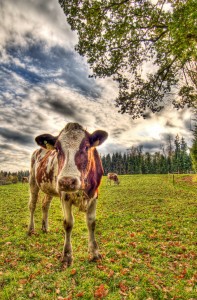Happy Diwali! The Hindu Festival of Lights began yesterday, all dazzling color and light and yummy foods. A lesser-known holiday celebrating the other end of the food cycle takes place today. Here is my post in honor of Govardhan Puja, a post that appeared this week on the Intent Blog.
 Holy shit—in English, a throwaway phrase, a cussword—is for some people literally true: shit is holy. For farmers in India, life begins in “that amazing gift from cows,” says physicist and food activist Vandana Shiva.
Holy shit—in English, a throwaway phrase, a cussword—is for some people literally true: shit is holy. For farmers in India, life begins in “that amazing gift from cows,” says physicist and food activist Vandana Shiva.
I don’t know how many of you are aware, the reason the cow is sacred in India is because of the shit.
Shiva smiles her warm and mischievous grin. She’s speaking to an audience at Emory’s Center for Ethics, a talk called “Creating Food Democracy” (video link no longer available). It’s the week of Diwali, the Hindu Festival of Light, which begins this year on November 13.
Diwali is the fall festival celebrating the bounty and goodness of the Earth. People wear colorful new clothes and light dozens of candles, decorating their homes—and each other—with brightly colored powders and eating sweets together. It’s a dazzling celebration of light, joy, abundance, and the triumph of good over evil.
As a harvest festival, Diwali began in gratitude toward the Earth, and Shiva doesn’t let her audience forget it. With a twinkle in her eye, Shiva reminds listeners that the day after Diwali is devoted to showing reverence to the other end of the food cycle, the manure:
One day after Diwali is a festival called Govardhan Puja. “Govar” is cow dung, “dhan” is wealth, “puja” is prayer—a whole day dedicated to the worship of cow dung!
Traditionally in some parts of India, on Govardhan Puja people make little hillocks of cow dung, decorate them with flowers, and offer prayers.
Shiva calls attention to the earthy meaning of the holiday for good reason: her lifework is about soil, food, and ecology. She educates people about seed sovereignty—the need for seeds to remain free of corporate control and the need for people who plant them to have control over their seed stock rather than being required to purchase seeds, including genetically modified seeds, from corporate giants.
I saw Vandana Shiva in person for the first time a few years back, and before the packed auditorium in my hometown of Boulder she was radiant. Again with mischief in her smile she said,
You know, “organic farming” is traditional Indian agriculture.
Boulder gardeners chuckled appreciatively. They too are doing what farmers in India have done for centuries—replenishing their soil with dung and compost. Seeds cannot grow without shit.
But cow dung in the American system of industrial farming becomes a gigantic problem. When enormous numbers of cattle are kept together, their dung and urine become huge sources of pollution. If we needed any more evidence that factory farming is diabolical, we only need to see how in factory farming cow dung is pollution rather than gift. (Diabolical here = harming the ecosystem, including animals and humans.) Factory farms disregard the gift of shit—with disastrous results to water, soil, and air.
By contrast, permaculture and organic farmers are working as nature has done for millennia, growing food by using the whole cycle of life, including the manure. In The Omnivore’s Dilemma Michael Pollan talks about Polyface Farm in the Shenandoah Valley of Virginia, where the Salatin family produces an enormous amount of food from only 100 acres of pasture. In one growing season their modest acres yield 35,000 dozen eggs and 35 tons of beef and pork.
How do they do it? The secret is the shit. They rotate six species of animals across the pasture. The animals clean up after one another. “One species’s manure becomes the next one’s lunch,” says Pollan. Cows graze for one day in a corner of the pasture, then they’re moved out. Three days later the laying hens are moved in. Why wait three days? So maggots can develop in the cow dung. When the hens are moved in, they scramble among the cow patties to find their favorite protein treat—fresh maggots. Meanwhile, the chickens too are pooping, and their nitrogen-rich dung fertilizes the pasture some more. Fed by all this richness, the grass grows so fast that in four or five weeks the cycle can be repeated. Asks Pollan,
Can organic feed the world? Well, look how much food is produced on 100 acres.
How much food? Enough meat alone (not counting eggs) to feed nearly 400 Americans, the largest meat eaters in the world, for an entire year.
The secret is symbiosis—allowing each species to feed the cycle of life. Which means allowing “waste” to do its job—to become the gift that nature intends it to be.
“Waste” is priceless to the cycle of life. Shit is holy.
This year the Hindu world celebrates Diwali, the Festival of Light, on November 13. And one day after Diwali—November 14—is Govardhan Puja.
So, in honor of the bountiful Earth, Happy Diwali! And in honor of the complete cycle of life, Happy Holy Shit Day!
For more information:
- Here is Vandana Shiva giving a lecture on “Just Food” in February 2012.
- On the place of cows in sustainable agriculture in India, see “Mad Cow vs. Sacred Cow” by Lincoln Kaye.
- Watch Michael Pollan talk about Polyface Farm here (last 7 min of video).